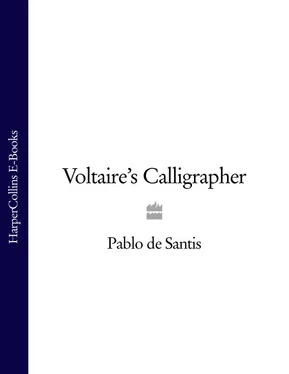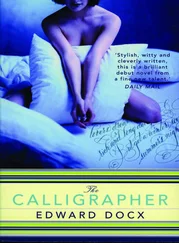When the Retz sank and my parents were lost, I was left in the care of my uncle, maréchal Dalessius. He asked me what my talents were, and I showed him some alphabets I had invented. On one page the letters were the branches of a tree, hinting at leaves and thorns; on another they were oriental palaces and buildings; and on the third - the most complicated - the letters were resigned to simply being letters. My uncle had been waiting for some indication of how best to get rid of me, and those sheets of paper were his answer. He sent me to Monsieur Vidors’ School of Calligraphy, where the mysterious Silas Darel had studied.
My difficulties with authority soon began: I wasn’t satisfied with writing alone; I wanted to invent pens and inks, to reestablish our craft. Calligraphy was a dying art, condemned by a shortage of masters, besieged by the printing press, reduced to the lone squad or man. I would scour the history books for heroes who might be considered calligraphers, but there were only heroes who never wrote a word.
The most enterprising of us, those who hoped to follow in Silas Darel’s footsteps, would read whatever we could, from old school textbooks to anonymous dissertations on cryptography. Our profession was so dead that we felt like archaeologists of our own kind.
Complete silence reigned in the classroom, interrupted only by the scratching of quills on paper - a noise that was itself a metaphor for silence. The long hall had floor-to-ceiling windows on both sides, and our teachers insisted they remain open, even in winter, claiming that a well-ventilated room was essential to good penmanship. In blew dirt, twigs, and pine needles that my classmates would angrily brush off the page, but I would leave them, believing you must respect the marks of circumstance when writing. All but a few resigned themselves to using the school’s supplies, purchased twice a year from a Portuguese sailor: black ink that soon lost its color, red ink full of lumps, sheets of paper whose imperfections caused letters to jump off the page as if skipping rope, and goose quill pens chosen at random.
After dinner and prayers, I would hide in my room or the garden, beside a stone fountain with green water so putrid you could write with it, and experiment with my own inventions. My favorite ink consisted of pig’s blood, alcohol, and iron oxide. I would buy the left wings of black geese at the market and pluck the feathers one by one, discarding fourteen out of every fifteen. Having selected the best, I would heat sand in a copper bowl then pour it into a wooden case: there I would leave the quills to harden. I kept all of my implements in a sewing box that had belonged to my mother, and still held a bronze thimble and the smell of lavender.
When I left Vidors’ School, my uncle found me a job with the courts. It was a natural fit for those of us who graduated; others wound up as librarians or as private scribes for the most distinguished families. I began to carry the tools of my trade from one government office or courthouse to another. This was an era of all things fragile and futile: I have never seen anything like it since. I was once given a death sentence to prepare, that was then shown to the convict, full of arabesques and wax seals, on his way to the gallows. He said: Thank the calligrapher for having turned my crimes into something so beautiful; I would kill ten more men just to have him create something similar again. Never, in my life, have I received higher praise.
Bottles of squid ink, scorpion venom, sulfur solution, oak leaves, and lizard heads all sat together in my room. I had also experimented with invisible inks, based on instructions I found in a copy of De Occulta Caligraphia that I bought from a bookseller on rue Admont, and was forbidden at Vidors’ School. It promised water-based inks that would become visible upon contact with blood, or when rubbed with snow, or exposed for long hours to the light of a cloudless moon. Other inks took the opposite route, and would go from black to gray and then disappear altogether.
My career in the courts came to an end when I prepared the death sentence for Catherine de Béza, convicted of murdering her husband, General de Béza. When the general fell ill, his wife sent for his long-time physician - a man who, nearly blind, was prone to prescribing obsolete medications and signing death certificates with no questions asked. But that very morning the old doctor awoke with a fever and sent his young protégé instead. By the time he arrived, the general was already dead. It took no more than a minute for the young physician to determine it wasn’t of natural causes: he peered under the cadaver’s nails with a magnifying glass and found traces of arsenic.
Madame de Béza was tried and found guilty. She was taken to the gallows, but the executioner was unable to proceed: the page containing the verdict, covered in writing just a few hours earlier, was now a blank sheet enlivened only by red wax seals. Some understood the disappearance to be a sign from God, attributing it to the virtue of the accused rather than the folly of the calligrapher, and so Catherine’s noose was exchanged for jail.
As for me, they tried to accuse me of conspiracy; I attempted to explain my mistake using arguments of science and fate but was still sent to prison for three months.
I went to my uncle’s as soon as I was released, yearning to sleep night and day in a real bed, free of the stench, the screams, and the rats. My uncle, however, had already gathered my things, and his cold embrace celebrated not my return but my departure.
‘I took the liberty of offering your services while you were in prison. I sent some old acquaintances a brief list of your abilities and a long list of your incompetence, so as not to be called a liar.’
‘Did anyone respond?’
‘The only reply came from Château Ferney. They read everything backwards there: they understood your vices as virtues, and agreed to hire you immediately.’
I was twenty years old and all I owned was a sewing box full of quills and inks. It would have been impossible to get to Ferney if my uncle, maréchal Dalessius, hadn’t run a company called Night Mail that transported the fallen. Hundreds of bodies arrived in France during wartime that had to be returned to their cities and towns. The post had initially seen to this, but letters and merchandise would arrive in such a deplorable state that people stopped reading their correspondence; as soon as the mail arrived, it was burned. The dead had managed to isolate the outer regions of our kingdom.
The Night Mail was devoted solely to funeral transport. My uncle inherited the business from my grandfather, and operations were run out of a warehouse on the outskirts of Paris that had once been a meat salting facility. There the bodies were sorted, put into coffins - often filled with salt, as if to maintain the tradition - and sent out on the roadways of France. There were only twenty-five hearses; since routes were uncertain and mistakes common, families could wait months for a body to arrive. At first, in the clamor of war, the fallen were received as heroes, but as time wore on and the fighting came to an end, the traveler would reach home like a postman bearing bad news, an inopportune visitor who spoke of a conflict everyone had managed to forget.
My uncle had a small shuttered window put in the caskets, to view the occupant and thus prevent mistakes. Another of his innovations was to hire a button manufacturer to strike medals so every soldier could be given a set. In this way, everyone went home a hero. We have very strict rules in this profession, maréchal Dalessius would say: Wear black, work at night, keep silent.
Business would fall dramatically whenever there were no wars or epidemics. In order to build up his clientele, my uncle began to disseminate a Benedictine theologian’s theory: he asserted that, to get into heaven, a person must be buried in his birthplace, or at a distance of no more than that between Bethlehem and the Holy Sepulcher. This little ruse, plus an agreement with the government to cart corpses from the gallows and prisons, ensured my uncle was never short of patrons, even in the worst times of peace.
Читать дальше












